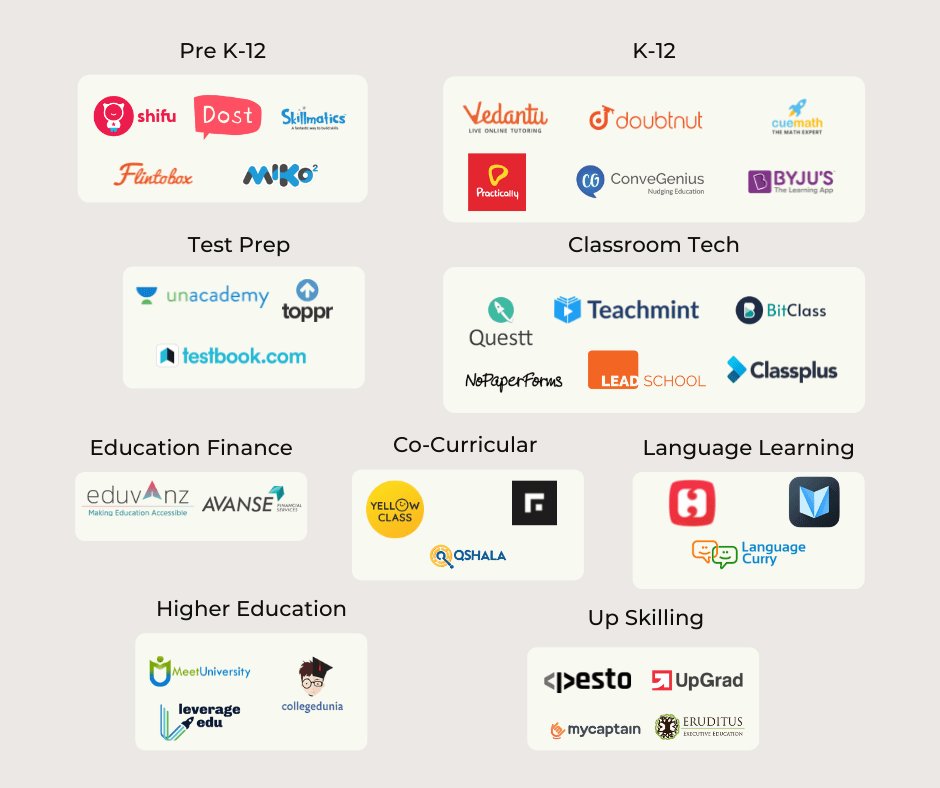In 2020, in a single week, I received calls from different EdTech companies to join as a consultant teacher. I was being offered an exponential increase from the present school’s salary along with various employee perks such as medical insurance, Employee Stock Ownership Plan (ESOP), better working hours, and leaves. Later, I realised that all my fellow teachers in the school were receiving similar offers, and a few of them had even made the switch and joined EdTech companies, while the rest of us continue to work in a traditional school setup. It has been two years since, and I continue to receive such calls for recruitment offering better perks.
—Ms Bharati, Private School Teacher
Bharati is a private school teacher in the national capital and narrates her encounter with the EdTech recruitment process since the onset of the COVID-19 pandemic. According to the data collected by the Indian EdTech Consortium, the Indian EdTech sector has generated more than 75,000 jobs for the Indian workforce in the last five years. More recently, the EdTech players claim that their sector has played a significant role in employment generation in India, which had been affected by the pandemic. These positions offered by these companies include teachers and other professionals working in the business, sales, marketing, and software.
As schools across India have reopened after a gap of more than 20 months, the government might have just missed the opportunity for planning and implementing reforms to the fast-growing EdTech sector. The lack of timely reforms has largely helped the EdTech sector flourish, but at the cost of its stakeholders—lakhs of teachers, students and parents, and schools.
India’s EdTech Sector in a Snapshot
The pandemic has accelerated the boom of the already growing EdTech industry in India. With schools ordered to shut operations as part of COVID safety regulations, the education sector saw the proliferation of EdTech companies venturing into supplanting in-person school learning. This was made possible through an end to end solution; from hiring teachers for facilitating online classes to creating knowledge resources and tools.
The EdTech industry’s expanding scope of work includes pre-K-12, K-12, language learning, upskilling, and higher education among other areas of learning. As of January 2022, the financial valuation of the fast-growing EdTech industry is at a whopping $2.8 billion, which has a projected potential to increase to US$10.4 billion by 2025. With 9,000 and counting EdTEch companies in the sector, India alone boasts five EdTechs that are now recognised as unicorns. This has significantly changed the Indian education landscape within a short span with the entry of EdTech giants like Unacademy, Vedantu, and Byju’s gaining the position as the most valued company.

This rapid growth has generated numerous opportunities for a mass hiring of teachers, especially during the initial few months of the pandemic, which enabled millions to transition to the EdTech sector. The mass hiring came in when the world grappled with reimagining the education landscape as a means to support the large pool of students and teachers. As the tide of time rolls, with school reopening and resuming in-person classes across the country, certain EdTech companies have found their business at a low ebb.
In February 2022, the sector witnessed the collapse of Lido Learning, an EdTech start-up, due to a financial crunch. Another EdTech cited the same reason while firing its employees. These extreme tectonic shifts in India’s EdTech sector highlight the ambiguous realities of the key stakeholders—the students, parents and teachers.
EdTech Companies Continue to Grow, But What About Teachers, Students, and Parents?
In May 2020, I received a series of phone calls from various EdTech companies making their sales pitch on why we should choose them for my daughter, who was in 6th grade then. My daughter is in 8th grade now. I was amazed by the different services provided [by the EdTech companies] at a time when physical classes had come to a standstill. And so, we enrolled our daughter for a few courses that included both academics and extracurriculars.
—Mrs Roy, Parent
Mrs Roy, the mother of an eighth-grader studying in Madhya Pradesh is not the only one who received such phone calls. During the pandemic, and even earlier, lakhs of parents have been convinced by EdTech companies’ salespersons to sign up for their services. Even school teachers across the country have been lured into joining EdTechs through these targeted sales campaigns by companies.
The market that the EdTech giants have created requires a mindset shift that drives the parents of millions of children to avail of education services. This has been made possible through a series of targeted advertising campaigns, sales pitches made to parents, and market strategies pitched in the name of ‘improving the education landscape’. Mr Mehta, a parent from New Delhi, recalls the series of EMIs he had to pay for his son studying in third grade to avail of extra-curricular classes offered by an EdTech company.
This put us in a tricky spot as the pandemic had adversely impacted my income; I work for a private firm in New Delhi. Nonetheless, I didn’t want my son to miss out on this opportunity.
—Mr Mehta
What came to notice eventually were the serious issues involved in creating this market and need. The services required parents like Mrs Roy and Mr Mehta to enter the vicious cycle of loans and EMIs that snowballed into a series of problems. Even parents who knew that availing of education services from EdTechs could put them in financially vulnerable situations went ahead and made the choice.

WTF is wrong with @BYJUS?
— Ravisutanjani (@Ravisutanjani) February 5, 2021
I got a call from one of my Relative, The Sales guy pitched her wife to get the kid enrolled for some 'Home Learning Plan'
She said the boy is getting a ₹30k scholarship so they need to pay only ₹5000 in Bank and ₹25k in EMIs.#EdTech Thread ⬇️
The EdTech sector boom is not limited to the ever-growing participation of the students and accelerated funding opportunities but also includes the rising exodus of the teachers from schools to such digital companies. In the last few years, the Indian EdTech Sector has realised the importance of teacher engagement and having a human-to-human interaction in its core methodology to succeed.
EdTech companies have been aggressively engaging and hiring teachers to provide a holistic schooling experience to the students over a digital platform. As the enrolment rate of students increased on such platforms, the drive to hire teachers with school experience, private tutors, and homemakers who have had some expertise or experience in the education sector exponentially grew. However, prior to the COVID-19 pandemic, the involvement of school teachers in such digital companies was glaringly less.
Before the pandemic, we were approached by the digital companies to join them on a part-time basis to either provide tutoring services or train their teaching staff. We were not approached to join them on a full-time basis as teachers. However, things have changed now. There is a rising trend amongst the teachers to move to the digital platform from the comfort of their homes as opposed to physically teaching in a school.
— Mr Naresh, a primary school teacher in South Delhi
What is Driving Teachers to Join EdTech Platforms?
With the reopening of schools, there has been a rising trend in the school teachers self-applying and joining the EdTech sector. Various players in the sector have spoken about the surge in job applications and the hiring of school teachers. While speaking to the Mint, Maneesh Dhooper, Co-founder of PlanetSpark said, “We get 20,000 applications for posts of teachers every month. About 70% of the teachers come from places such as Bareilly (Uttar Pradesh), Jalandhar (Punjab), and Paradeep (Odisha). This points toward the various factors driving the ongoing popularity of EdTech companies amongst teachers, which include higher remunerations, allowances, medical insurance, and Employee Stock Options (ESOPs) that give teachers a stake in the profits of the organisation. Recently, EdTech Unicorn LEAD School offered Employee Stock Options (ESOPs) to its employees to provide them with a stake in the company. Prashant Sharma, the Founder and Director of Mylassroom, gave some clarity on the driving factors in his interview with the Mint. Prashant said, “EdTech firms work like corporates and there are retention measures. Salaries for our teachers that range between ₹50 lakh and ₹2 crores, leave travel allowance and medical insurance are provided.”
The school teachers are also transitioning to digital companies due to an excess of administrative and non-teaching responsibilities that they have to adhere to in the school system. This becomes evident while speaking to a Pune-based English teacher who has transitioned from a private school in Pune to a digital platform.
During my school tenure, I was teaching English to three grades and was also managing various administrative works such as admission drives, infrastructure and IT development, and handling student departments in the school. However, my remuneration was based only on my teaching work and not on additional duties that I was performing. Now in my current role, I am teaching English to 20,000+ students through streaming platforms and I am paid proportionately.
—A Teacher, anonymized
Another driving factor is the liberty to work remotely in the comfort of their homes which is empowering the teachers to take up diverse income opportunities. The teachers, although receiving the perks and benefits of working in a corporate setup, are also bound by severe contractual obligations such as non-disclosure agreements to openly and freely talk about their work and workplace with outsiders, including journalists.
EdTech Sector’s Impact: The Good and the Bad
While these driving factors continue to direct an increasing number of teachers to join the EdTech sector, what we now see is a simultaneous laying off sprees. For instance, just last month, another EdTech unicorn Unacademy fired more than 600 employees in various tranches due to cost-restructuring exercises to become more profitable. Unacademy said that they would pay severance packages to ousted employees and all their dues shall be paid off.

If laying off was the worst outcome one could expect, a few months back, EdTech startup Lido Learning shut down its operations without any notice to its employees or customers [the students and parents in this sector] due to a cash crunch. The employees took to social media to raise concern and aggravate their situation that they were not provided with any notice and had not been paid for the past few months. Along with vendors and employees, the parents also took to social media to demand the return of their already invested monies for the company’s services and demanded justice for the future of their children.
The EdTech companies, ultimately, are business enterprises driven by profitability and have invested majorly in their branding and expansion. The focus now needs to shift from profitmaking to delivering on promises of quality education and better working conditions for its employees, including educators. The question that is raising interest in the sector is whether such teachers, the employees of a private business company, have any protection by law under the Government of India’s Ministry of Education, or are the employees only protected by labour laws and contractual agreements as done in other corporate firms? In part two of this series, we look at how the EdTech sector is being regulated at present, the concerns that it raises, and what could be the way forward to protect the interests of the stakeholders.
Featured image taken by Ashima Gulati of students attending an online class from their homes during the COVID-19 pandemic.






[…] startups indefinitely. Initially, the pay and flexibility were a huge draw, but as losses piled up, teachers’ salaries were hit. Many were even […]
[…] Part 1 of the EdTech in India series, we looked at how the fast-growing Indian EdTech industry is […]